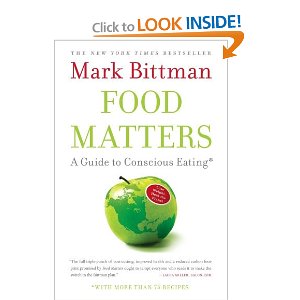 Food writer Mark Bittman recently ended his long-running Minimalist column in the New York Times to shift into a new role as an opinion writer for the Times.
Food writer Mark Bittman recently ended his long-running Minimalist column in the New York Times to shift into a new role as an opinion writer for the Times.
This change of perspective, that food is about so much more than filling our bellies, is apparent in his book “Food Matters: A Guide to Conscious Eating.”
Bittman wrote in the announcement of the Minimalist’s end:
My growing conviction that the meat-heavy American diet and our increasing dependence on prepared and processed foods is detrimental not only to our personal health but to that of the planet has had an impact on my life and on that of the column. You can see this in dishes like stir-fried lettuce with shrimp, chickpea tagine with chicken, a number of bean dishes and the dozens of other meatless or less-meat recipes that have become dominant in the last five years.
In part, what I see as the continuing attack on good, sound eating and traditional farming in the United States is a political issue. I’ll be writing regularly about this in the opinion pages of The Times, and in a blog that begins next week.
I loved Mark Bittman a decade ago when I first discovered “How to Cook Everything,” a giant but accessible resource that answers basic questions like how to cut an artichoke or how long to cook salmon, while also demonstrating numerous ways to riff on the essentials — if you can do pasta and tomato sauce, you can do so much more.
Then came “How to Cook Everything Vegetarian,“which brought Bittman’s breezy, casual “more a guideline than a recipe” approach to meatless cooking. Both get a heavy workout in our kitchen.
Food Matters is about half cookbook, half manifesto. It’s a call to action to change how we eat personally for our own health and well being, as well as for that of the environment and for the animals we eat.
Some excerpts from Food Matters:
- 1 billion people in the world are chronically hungry; 1 billion are overweight
- If, during the last 40 years, the government had been promoting a diet of less meat and refined carbohydrates and more vegetables, fruits, legumes and whole grains, we’d unquestionably be a healthier country.
- We currently raise 60 billion animals each year for food — 10 animals for every human on earth. The projection is that just to sustain current consumption levels (and consumption is increasing, so this is conservative), by 2050 we’ll be raising 120 billion animals a year. That number would require using more land for agriculture than exists.
- 7 percent of Americans’ calories come from soda; 2,200 calories are required to produce a 12 ounce can of soda
- Each American eats an average of one cup of sugar a day. It appears that the more fructose you eat, the hungrier you feel.
Bittman urges readers to follow The Pritikin Principle approach to eating, which is to consume foods that have relatively few calories by volume. Fill up on foods that don’t get you fat but do leave you feeling full. For example, 100 grams of chocolate cake contains 333 more calories than the same weight of broccoli.
He also calls for eating locally for a number of reasons. “It makes people think about seasonality and about how ridiculous it is to eat summer fruits and vegetables in January; ending or limiting that habit would be unquestionably good for the environment (and for the cook; there is joy in eating seasonally.) Locavorism has been a boon for urban and suburban farmers markets, and — more importantly — for the farmers who supply them. That in turn helps rural economies. Most important, produce fresh from the ground and animal products raised by real humans provide the most nourishment and the most enjoyment.”
I have been moving in this direction for years — buying more of my food at farmers market, cooking according to the seasons instead of buying strawberries and asparagus in the winter, for example.
Still, Bittman’s urging to make beans and rice once a week forced me to learn some new skills. I’ve been experimenting with various combinations of legumes, grains and spices, and learning how much we’ll realistically eat from each of these batches before we tire of them. Fortunately, at least the lentils and rice turned out to be a good base for soup, too.
The notion that what’s in my fridge has a larger impact is what prompted me to become a vegetarian, so that’s not new, but it is a good reminder that I’m voting with my wallet. If I care about small, sustainable farms, I need to make the effort to support them, even if it takes a little more effort.
I also sometimes struggle with balancing my priorities when I want something to be reasonably priced, vegetarian and not calorie heavy. Doing more of my own cooking, maybe making that big pot of rice and beans, can help here.
Have you read Food Matters? What did you think? Did you change any of your eating, shopping or cooking habits as a result?


1 Comment
Leave a reply